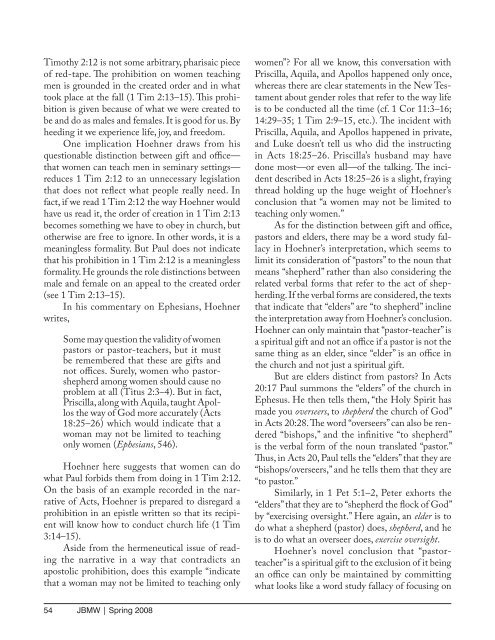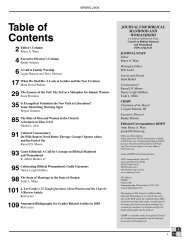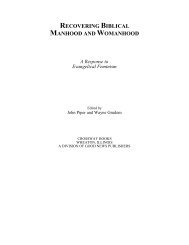Download PDF - The Council on Biblical Manhood and Womanhood
Download PDF - The Council on Biblical Manhood and Womanhood
Download PDF - The Council on Biblical Manhood and Womanhood
Create successful ePaper yourself
Turn your PDF publications into a flip-book with our unique Google optimized e-Paper software.
Timothy 2:12 is not some arbitrary, pharisaic pieceof red-tape. <str<strong>on</strong>g>The</str<strong>on</strong>g> prohibiti<strong>on</strong> <strong>on</strong> women teachingmen is grounded in the created order <strong>and</strong> in whattook place at the fall (1 Tim 2:13–15). This prohibiti<strong>on</strong>is given because of what we were created tobe <strong>and</strong> do as males <strong>and</strong> females. It is good for us. Byheeding it we experience life, joy, <strong>and</strong> freedom.One implicati<strong>on</strong> Hoehner draws from hisquesti<strong>on</strong>able distincti<strong>on</strong> between gift <strong>and</strong> office—that women can teach men in seminary settings—reduces 1 Tim 2:12 to an unnecessary legislati<strong>on</strong>that does not reflect what people really need. Infact, if we read 1 Tim 2:12 the way Hoehner wouldhave us read it, the order of creati<strong>on</strong> in 1 Tim 2:13becomes something we have to obey in church, butotherwise are free to ignore. In other words, it is ameaningless formality. But Paul does not indicatethat his prohibiti<strong>on</strong> in 1 Tim 2:12 is a meaninglessformality. He grounds the role distincti<strong>on</strong>s betweenmale <strong>and</strong> female <strong>on</strong> an appeal to the created order(see 1 Tim 2:13–15).In his commentary <strong>on</strong> Ephesians, Hoehnerwrites,Some may questi<strong>on</strong> the validity of womenpastors or pastor-teachers, but it mustbe remembered that these are gifts <strong>and</strong>not offices. Surely, women who pastorshepherdam<strong>on</strong>g women should cause noproblem at all (Titus 2:3–4). But in fact,Priscilla, al<strong>on</strong>g with Aquila, taught Apollosthe way of God more accurately (Acts18:25–26) which would indicate that awoman may not be limited to teaching<strong>on</strong>ly women (Ephesians, 546).Hoehner here suggests that women can dowhat Paul forbids them from doing in 1 Tim 2:12.On the basis of an example recorded in the narrativeof Acts, Hoehner is prepared to disregard aprohibiti<strong>on</strong> in an epistle written so that its recipientwill know how to c<strong>on</strong>duct church life (1 Tim3:14–15).Aside from the hermeneutical issue of readingthe narrative in a way that c<strong>on</strong>tradicts anapostolic prohibiti<strong>on</strong>, does this example “indicatethat a woman may not be limited to teaching <strong>on</strong>lywomen”? For all we know, this c<strong>on</strong>versati<strong>on</strong> withPriscilla, Aquila, <strong>and</strong> Apollos happened <strong>on</strong>ly <strong>on</strong>ce,whereas there are clear statements in the New Testamentabout gender roles that refer to the way lifeis to be c<strong>on</strong>ducted all the time (cf. 1 Cor 11:3–16;14:29–35; 1 Tim 2:9–15, etc.). <str<strong>on</strong>g>The</str<strong>on</strong>g> incident withPriscilla, Aquila, <strong>and</strong> Apollos happened in private,<strong>and</strong> Luke doesn’t tell us who did the instructingin Acts 18:25–26. Priscilla’s husb<strong>and</strong> may haved<strong>on</strong>e most—or even all—of the talking. <str<strong>on</strong>g>The</str<strong>on</strong>g> incidentdescribed in Acts 18:25–26 is a slight, frayingthread holding up the huge weight of Hoehner’sc<strong>on</strong>clusi<strong>on</strong> that “a women may not be limited toteaching <strong>on</strong>ly women.”As for the distincti<strong>on</strong> between gift <strong>and</strong> office,pastors <strong>and</strong> elders, there may be a word study fallacyin Hoehner’s interpretati<strong>on</strong>, which seems tolimit its c<strong>on</strong>siderati<strong>on</strong> of “pastors” to the noun thatmeans “shepherd” rather than also c<strong>on</strong>sidering therelated verbal forms that refer to the act of shepherding.If the verbal forms are c<strong>on</strong>sidered, the textsthat indicate that “elders” are “to shepherd” inclinethe interpretati<strong>on</strong> away from Hoehner’s c<strong>on</strong>clusi<strong>on</strong>.Hoehner can <strong>on</strong>ly maintain that “pastor-teacher” isa spiritual gift <strong>and</strong> not an office if a pastor is not thesame thing as an elder, since “elder” is an office inthe church <strong>and</strong> not just a spiritual gift.But are elders distinct from pastors? In Acts20:17 Paul summ<strong>on</strong>s the “elders” of the church inEphesus. He then tells them, “the Holy Spirit hasmade you overseers, to shepherd the church of God”in Acts 20:28. <str<strong>on</strong>g>The</str<strong>on</strong>g> word “overseers” can also be rendered“bishops,” <strong>and</strong> the infinitive “to shepherd”is the verbal form of the noun translated “pastor.”Thus, in Acts 20, Paul tells the “elders” that they are“bishops/overseers,” <strong>and</strong> he tells them that they are“to pastor.”Similarly, in 1 Pet 5:1–2, Peter exhorts the“elders” that they are to “shepherd the flock of God”by “exercising oversight.” Here again, an elder is todo what a shepherd (pastor) does, shepherd, <strong>and</strong> heis to do what an overseer does, exercise oversight.Hoehner’s novel c<strong>on</strong>clusi<strong>on</strong> that “pastorteacher”is a spiritual gift to the exclusi<strong>on</strong> of it beingan office can <strong>on</strong>ly be maintained by committingwhat looks like a word study fallacy of focusing <strong>on</strong>54 JBMW | Spring 2008




